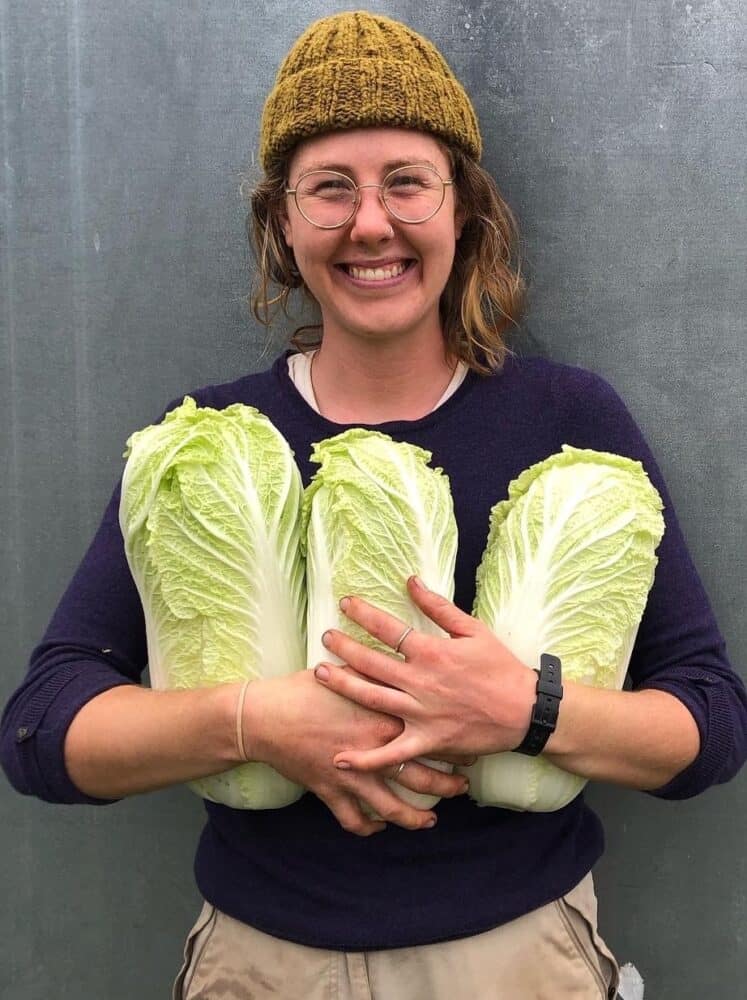Paul Beingessner Award Essay Competition National Farmers Union
By: Rebecca MacInnis (Age 26)
It’s no surprise that agriculture, like many things in our colonial nation, was built on the backs and without the recognition of Black and Indigenous people. From the theft and disregard of Indigenous lands and practices to the blatant exploitation of Black bodies through times of slavery and beyond to the mistreatment of migrant workers, our capitalist and exploitative food system is inherently flawed.
Agriculture does not exist in a silo, it is intertwined with the day to day life of everyone on earth. Making the food system more just means altering everything with which it interacts. So much of the messaging regarding activism in the mainstream media targets the individual and claims that consumer choices are impactful and can make a difference. While “voting with your dollars” should not be discounted in every context, it is especially harmful when it comes to food, something that we all consume everyday. Buying local and organic is advertised as clean and moral, while convenience food is seen as dirty and cheap.
This justification places the blame on the eater by creating judgement based on what they can afford. The systemic issue at play here is labour inequality and freedom of choice. To start the transition to a more just and anti-racist food system, we must first consider the labour movement. At the very least, to me an anti-racist and socially just food system starts with an increase of minimum wage and an improvement of labour rights and ends with the abolishment of capitalism. Any changes that are still reliant on operating within a capitalist framework are destined to remain exploitative in nature. The Covid-19 pandemic has shone a much needed light on the exploitation in our society and has made it more obvious than ever that the lowest paid among us are the most essential. We need to reframe our world and our minds to begin this transition.
Labour rights should be challenged across the board, not only with consumers. Who can afford to buy what, and why is some work more deserving of higher pay? This is an issue that can be highlighted on farms across Canada. The current norm is that farming internships, specifically on small-scale organic farms, are unpaid. This norm is harmful because all work should be compensated, but more so because it creates a barrier to entry whereby only those in a privileged enough position may earn the “qualifications” to be a farmer. The corporatization of our food system has nudged along the degradation of agricultural knowledge, but unpaid work should not be the method by which we reintroduce it. We are at a point where we must move away from the master classes taught by white men and without regard for the traditional knowledge upon which they are so often based. We need to move away from poor representation that demonstrates agriculture as a monoculture of white faces. We know the negative impacts of monocultures and need to strengthen, diversify, and create resiliency in our system.
It is at this time that we as young farmers need to step up. I, as a white settler myself, need to decenter myself from the story and we, the youth, need to show solidarity and amplify the voices of the M i’kmaq fishers exercising their treaty rights, of the migrant workers fighting for decent housing, of the Northeast Farmers of Colour working to put land into trust. We need to do more than acknowledge our presence on Indigenous land, in my case unceded Mi’kma’ki. We need to participate in the Land Back movement: returning land and demanding treaty rights be upheld. We need to abolish the police, create affordable housing for all, and demand living wages. We need to stand in solidarity with grassroots peasant movements and push for agrarian reform to redistribute land resources. We need to work cooperatively and against corporate takeover. Food is political. And may we, the youth, harness that fact by looking beyond the agricultural system to make society as a whole more anti-racist and just.

